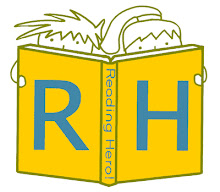 Allow me to be unusually controversial for a while:
Allow me to be unusually controversial for a while:When I visit a class of six year olds, I expect them to be able to write their own name legibly, copy my name and a book title from the board, and write a simple sentence about the story they have just heard, this latter with some encouragement and assistance.
I expect this because this has been my experience over the last six years of working in infant schools. Inevitably there would be probably one child who was less able or willing to participate, but with persistence and encouragement that child would produce a lovely piece of work, and the child and teacher would be thrilled.
Increasingly, it is my experience that these proportions of ability have been quite reversed: it is only a handful of children in the class who are able to manage the task, whilst most of the class struggle to scribble their own name, have no idea of what they are copying from the board, are not able to copy it accurately, or even approximately from the board, and are entirely flummoxed by the thought of having to write a short sentence, even with considerable help.
Teachers and classes of children vary enormously of course, but I am concerned that too many children are not learning how to sit quietly and concentrate on a piece of work. They are not expected to be able to achieve much, so they don’t. If they manage to get something scribbled down quickly they get to choose to do something fun, but they are not encouraged to try a bit harder, to do a little bit more.
This was illustrated tome very clearly in a school where I worked with two classes, a year 1 group and a year 2 group. The year 1 group listened well, actively participated then produced work of a consistently high standard. The year 2 group, a whole year older, were noisy, couldn’t think of any relevant questions to ask, and produced rather mediocre work.
In discussing this with staff later, I realised that the difference was not down to the ability of the children, but to the ability of the teachers involved. The year 2 teacher was excused as a “maths specialist”.
A maths specialist??
These children are 6 and 7 years old, they don’t need specialist subject teachers! They need teachers who can create an atmosphere where they can learn effectively, who can enthuse them, spark their imaginations. We need teachers who can TEACH! Sadly the year 2 group experience is by far the more widespread now.
I always know when a teacher has prepared for my visit by the quality of the questions the children ask in our “Q’s and A’s” session. Children who have been prepared well and encouraged to give some thought about what it might be like to be an author and how books are made, have fantastic questions to ask. Unprepared children tend ask irrelevant and unfocussed questions about dogs.
There are some great teachers out there who do a fantastic job under very difficult circumstances. I’m not knocking teachers. But I do wonder about the prevalent classroom culture that is disabling children from learning effectively.
This culture dictates that it is acceptable, or even normal for small children to make a lot of noise; that it’s acceptable to be told umpteen times to listen, that doing anything is better than doing nothing, rather than doing their best.
Let’s bring back quiet classrooms, the skill of concentration and the reward of hard work being the piece of work itself.
This is a deeply complex issue, and not least affected by the numbers of children displaying special needs that are now in mainstream classes, but let’s not be deflected: how can small children work properly in a noisy disruptive environment?
I expect this because this has been my experience over the last six years of working in infant schools. Inevitably there would be probably one child who was less able or willing to participate, but with persistence and encouragement that child would produce a lovely piece of work, and the child and teacher would be thrilled.
Increasingly, it is my experience that these proportions of ability have been quite reversed: it is only a handful of children in the class who are able to manage the task, whilst most of the class struggle to scribble their own name, have no idea of what they are copying from the board, are not able to copy it accurately, or even approximately from the board, and are entirely flummoxed by the thought of having to write a short sentence, even with considerable help.
Teachers and classes of children vary enormously of course, but I am concerned that too many children are not learning how to sit quietly and concentrate on a piece of work. They are not expected to be able to achieve much, so they don’t. If they manage to get something scribbled down quickly they get to choose to do something fun, but they are not encouraged to try a bit harder, to do a little bit more.
This was illustrated tome very clearly in a school where I worked with two classes, a year 1 group and a year 2 group. The year 1 group listened well, actively participated then produced work of a consistently high standard. The year 2 group, a whole year older, were noisy, couldn’t think of any relevant questions to ask, and produced rather mediocre work.
In discussing this with staff later, I realised that the difference was not down to the ability of the children, but to the ability of the teachers involved. The year 2 teacher was excused as a “maths specialist”.
A maths specialist??
These children are 6 and 7 years old, they don’t need specialist subject teachers! They need teachers who can create an atmosphere where they can learn effectively, who can enthuse them, spark their imaginations. We need teachers who can TEACH! Sadly the year 2 group experience is by far the more widespread now.
I always know when a teacher has prepared for my visit by the quality of the questions the children ask in our “Q’s and A’s” session. Children who have been prepared well and encouraged to give some thought about what it might be like to be an author and how books are made, have fantastic questions to ask. Unprepared children tend ask irrelevant and unfocussed questions about dogs.
There are some great teachers out there who do a fantastic job under very difficult circumstances. I’m not knocking teachers. But I do wonder about the prevalent classroom culture that is disabling children from learning effectively.
This culture dictates that it is acceptable, or even normal for small children to make a lot of noise; that it’s acceptable to be told umpteen times to listen, that doing anything is better than doing nothing, rather than doing their best.
Let’s bring back quiet classrooms, the skill of concentration and the reward of hard work being the piece of work itself.
This is a deeply complex issue, and not least affected by the numbers of children displaying special needs that are now in mainstream classes, but let’s not be deflected: how can small children work properly in a noisy disruptive environment?








1 comment:
I loved this post!
Teachers should just naturally have a degree in child development/early childhood education. Not just...math...or a single, narrow-minded subject like that!
At my son's school, they incorporate the Multiple Intelligences theory...which concentrates on every single child as an individual...the teachers assess and zero-in to each child's abilities and work to sharpen and improve and encourage these.
Also, student-teacher ratio is important.
My word! What's happening over there, anyway?
Post a Comment